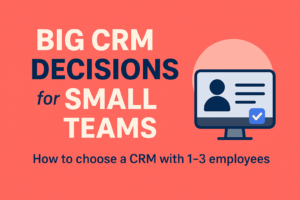CRM Article
Big CRM Decisions for Small Teams
SmallBizCRM Staff – September 11th, 2025
 Running a business with just one, two, or three employees can feel like spinning plates. Every task matters, every customer counts, and every decision carries weight. While large organizations often have layers of systems and staff to manage their operations, small businesses need smarter tools that deliver results without overcomplicating workflows. That is where a Customer Relationship Management (CRM) system comes in.
Running a business with just one, two, or three employees can feel like spinning plates. Every task matters, every customer counts, and every decision carries weight. While large organizations often have layers of systems and staff to manage their operations, small businesses need smarter tools that deliver results without overcomplicating workflows. That is where a Customer Relationship Management (CRM) system comes in.
The challenge? Choosing a CRM when your team is tiny can feel overwhelming. Do you really need one? Which features matter most? How do you avoid paying for things you will never use? Let’s break it down so that even the smallest team can make the right choice.
Why a CRM Matters for Teams of 1–3 People
Many owners think a CRM is only necessary once the company grows. In reality, having one early on helps build good habits, organize customer data, and avoid costly mistakes. Without a CRM, leads may slip through the cracks, follow-ups get missed, and client details are scattered across spreadsheets, emails, or even sticky notes.
For a small team, efficiency is the real game changer. A good CRM ensures that every person knows what is happening with each client, making collaboration seamless even when the whole “team” could fit around a single desk.
Key Factors to Consider When Choosing a CRM for a Small Team
1. Simplicity Over Complexity
Look for CRMs that focus on usability. If you only have a few people, the last thing you need is a steep learning curve. Clean dashboards, intuitive navigation, and straightforward data entry will make adoption much easier.
2. Affordability Without Sacrificing Value
Some CRMs are built for enterprises and come with enterprise-level pricing. For teams of 1–3, monthly fees should be reasonable. Cloud-based CRMs often offer tiered pricing, and many have entry-level plans designed for micro businesses.
3. Essential Features Only
You do not need a Swiss Army knife of tools. Instead, focus on the essentials:
-
Contact management
-
Task and follow-up reminders
-
Email integration
-
Simple reporting
-
Mobile access
Anything more complex might just clutter your workflow.
4. Collaboration Made Simple
Even if there are just two or three of you, collaboration is crucial. A CRM that allows easy note sharing, tagging team members, and assigning tasks ensures everyone stays aligned without unnecessary meetings.
5. Scalability for Future Growth
Your business may be small now, but what about next year? Choose a CRM that can grow with you. Look for solutions that allow you to upgrade to more advanced features once you need them, without forcing you to switch platforms entirely.
CRMs That Work Well for Tiny Teams
Here are some examples of CRMs that are often praised for being simple, affordable, and perfect for teams of up to three people:
-
 Less Annoying CRM: True to its name, it is built for small businesses that value straightforward functionality.
Less Annoying CRM: True to its name, it is built for small businesses that value straightforward functionality.
-
 Capsule CRM: Offers a balance between simplicity and useful features like email tracking and integrations.
Capsule CRM: Offers a balance between simplicity and useful features like email tracking and integrations.
-
 monday.com: A flexible tool that can start as a lightweight CRM and expand into full project management when your team grows.
monday.com: A flexible tool that can start as a lightweight CRM and expand into full project management when your team grows.
-
 noCRM.io: Designed for small sales teams, it focuses on lead management and follow-ups rather than complex features, making it ideal for 1–3 person businesses.
noCRM.io: Designed for small sales teams, it focuses on lead management and follow-ups rather than complex features, making it ideal for 1–3 person businesses.
Common Mistakes to Avoid
Even small teams can trip up when selecting a CRM. Watch out for these pitfalls:
-
Choosing based on popularity instead of fit: The biggest name is not always the best choice for your size.
-
Paying for unused features: Avoid packages loaded with extras that you will not touch.
-
Ignoring mobile access: If you are often on the move, a CRM with a weak mobile app will slow you down.
-
Not involving the team: Even with two or three people, make sure everyone tries the CRM during a free trial.
How to Start Your CRM Journey
The best way to decide is by trying. Most CRMs offer free trials that give you a feel for the interface, features, and fit. During this period, test it with real clients, check how easy it is to enter data, and see if it truly saves you time.
Also, define your goals early. Do you want to improve customer follow-ups? Track sales more clearly? Have all client data in one place? Your goals will guide your choice better than any feature checklist.
Final Thoughts
When you have only 1–3 employees, every decision counts and every tool needs to pull its weight. A CRM is not just another piece of software, it is a backbone for building relationships, creating structure, and setting your business up for future growth.
Start small, choose wisely, and you will discover that the right CRM is not just a system, it is a silent partner that helps you work smarter, not harder.